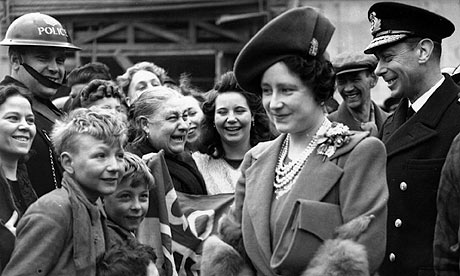Prince Albert (Colin Firth), the Duke of York, son of King George V, and known affectionately as Bertie to his family, struggles with a terrible stammer which causes him a great deal of shame and anxiety in his position as third in line to the throne. At first you might imagine Firth to be too handsome for the role but he has the right sort of vulnerability and gentleness to portray the Prince which the director Tom Hooper must have recognized immediately.
His wife Elizabeth, played by Helena Bonham Carter with exactly the right amount of haughtiness and icy beauty, meets with Lionel Logue (Geoffrey Rush), a highly effective, if unorthodox, Australian speech therapist. Logue's views are considered odd if not controversial. He insists that they call each other by their first names and that the Prince desist from smoking contrary to the advice of other physicians.
 |
| King George VIII and Colin Firth |
Logue also probes what he believes to be the psychological sources of Bertie's stammer - an autocratic father, the suppression of his left-handedness, a family and nanny which seemed to favor his brother David, the Prince of Wales, over him. This strengthens the bond between the men but realistically, we never forget the differences in class and the overt colonialism exhibited towards the Australian by the English.
A foppish Guy Pearce effectively portrays Bertie's elder brother David. The script overtly suggests the disadvantages that the younger Bertie faced when compared to the popular David who is suave, dashing, confident, and, merciless in his taunting of Bertie's affliction.
David is also determined to marry Wallis Simpson, the twice divorced American heiress, regardless of the cost to the crown and the royal family. As arrogant and selfish as David appears to be, the royals are not without blame. A mistress was fine as long as one did marry her nor flaunt her in public and she followed royal protocol. Yet we see the innate ridiculous snobbishness and superficiality of the royals, best exhibited in their attitude towards Simpson.
Wallis demonstrating friendliness towards Bertie and Elizabeth when they visit at Balmoral Castle leads to a snub by Elizabeth who derisively quips that a royal may only be initially greeted by another royal at Balmoral Castle - apparently a huge breach in royal etiquette. This also prompts some snide asides about how Wallis picked up her talents in a brothel.
The screenwriter David Seidler, who himself struggled with a stammer as a youth, and who waited many years to have the film produced, having promised the Queen Mother that he would never have it produced in her lifetime, captures the nuances of the royals - the vanity, the ego and self-satisfaction.
The royals are ridiculous and vain but it is to the credit of Firth and Bonham Carter that they retain our sympathy on screen. Largely, Bertie is seen as an innocent pawn thrust into the spotlight once David inherits the throne upon his father's death. Bertie recognizes with growing unease that David's sympathies lie with the Nazis and Germany. This is particularly worrisome as England is veering towards a war against Germany in the 1930s placing both the royal family and David, as King, in a dangerous conundrum. Click here for a delightful photo of Wallis and David meeting Hitler. Wallis was also rumored to have intimate relations with Joachim von Ribbentrop, the Foreign Minister of Germany from 1938 until 1945.
Pressures mount and Bertie begins to challenge Logue taunting him about Logue's failed acting career and his humble origins. Only Elizabeth's intervention brings the men back together again. Another small triumph of the film is the relationship between Elizabeth and Bertie. The scenes with the children Elizabeth (future monarch of England) and Margaret are tender and believable without being cloying or overly sentimental.
How rare it is to see a marriage portrayed on film which is equitable, loving, mutually supportive, tender. Bonham Carter is beautiful (as is Firth) and they are perfectly matched in talent and in capturing a certain ease and sense of privilege as the royal couple. They look exquisite in their clothes and they are utterly convincing.
When David abdicates the throne to marry Wallis Simpson as the royals prepare for the coronation at Westminster Abbey, Bertie insists that Logue be seated in the King's Box. This prompts an investigation into Logue's credentials by Cosmo Gordon Lang, the Archbishop of Canterbury (Derek Jacobi). Bertie is tense and unsure whether he can speak with confidence at the coronation. While rehearsing for the ceremony, Logue casually slumps in St. Edward's Chair, the throne on which the British monarch sits for the coronation. This ploy has the desired effect; this act enrages Bertie and he roars at Logue that he has as much right to sit in the chair as any before him. The coronation proceeds successfully.
 |
| Queen Elizabeth and King Edward VIII |










2 comments:
I loved it too! What films like this do, is humanize and personalize history, and whether completely factual or not, they spike interest and sympathy. That can't be bad!
I would happily watch it again!
Post a Comment